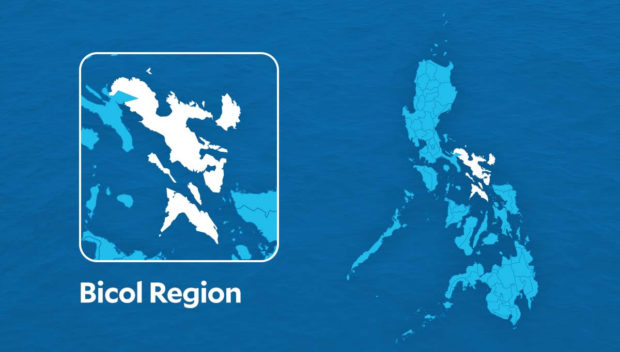
Bicol Region. INQUIRER FILES
LEGAZPI CITY—Some colleges in the Bicol region have again shifted to blended learning due to the extreme heat and the increasing number of COVID-19 cases that put at risk the health of students and school personnel.
In a memorandum issued on Tuesday, Gilbert Sadsad, Department of Education regional director, said elementary and high schools in the region could implement a modular distance learning or a modified scheme appropriate to learners.
“The shift in the class schedule will promote safety and protection of the learners and teachers from unnecessary physical danger that they may be exposed to these days,” Sadsad said.
In Legazpi City, Bicol University president Baby Boy Benjamin Nebres III ordered the adoption of blended learning, or a combination of in-person and online classes, from Thursday until the end of the second semester in May due to extremely high temperatures.
The state weather bureau recorded up to a 47 degree Celsius heat index in Albay province in the past few days.
In the island province of Catanduanes, the Catanduanes State University (CatSU) also adopted the hybrid learning setup starting Wednesday due to the extreme heat.
In a memorandum, CatSU president Patrick Alain Azanza said blended learning will be implemented until the end of the semester this May.
Flexibility
Under the implementation guidelines of hybrid learning at CatSU, classes will be held online, including the uploading and submission of school activities such as quizzes and assignments.
However, the administration clarified that for final examinations, “flexibility may be allowed on a case-to-case basis.”
During in-person classes, students have been allowed to wear comfortable but school-appropriate clothes instead of their uniforms.
Catanduanes, in the past few days, experienced extreme temperature, with the heat index ranging from 42 to 44 degrees Celsius.Alton Onato, a sophomore student at BU and a resident of Guinobatan, Albay, said the online setup would protect them from possible heat-related illnesses by keeping them indoors.‘Challenging’
“But it would be somehow challenging again for us students, especially those with poor signal and internet connections,” Onato said in an online chat on Thursday.
A teacher at CatSU, who asked not to be named, said in a phone interview on Thursday that “since the shifting was sudden, it will also be difficult.”
“There are many tasks left, there are activities that have been prepared but had to be canceled since [in-person classes] were suspended. The teachers will have a hard time imposing strict rules on the submission of exams since some [students] do not have internet access or gadgets,” the teacher added.
In Camarines Norte province, Camarines Norte State College vice president for academic affairs Dolores Volante ordered limited in-person classes from April 24 to April 30 after the Inter-Agency Task Force for the Management of Emerging Infectious Diseases placed the province under Alert Level 2 due to an uptick of COVID-19 cases.
Camarines Norte and Masbate were among the 26 provinces placed under alert level 2 due to low vaccination rates despite having zero and one COVID-19 case, respectively, as of April 26, according to the Department of Health in Bicol.
Limited activities
In Negros Occidental province, education officials in the province have directed teachers to limit students’ outdoor activities to avoid ailments due to the extreme heat.
“The hot weather condition experienced in the country at present is normal and inevitable although it is too severe, possibly because of the global warming caused by climate change,” said Anthony Liobet, Negros Occidental schools division superintendent, in a memorandum issued on Monday.
“Given this, all schools are directed to put in place the necessary precautions to minimize or mitigate the effects of the hot weather,” he said, noting that outdoor activities should not be conducted from 9 a.m. to 3 p.m.
When outdoors, Liobet advised teachers and students to use an umbrella as well as wear a wide-brimmed hat, ultraviolet protective sunglasses and loose-fitting clothes.
Gov. Eugenio Jose Lacson, for his part, reiterated on Tuesday that schools should go back to a June to March academic calendar to give students a break during the scorching summer months.
School officials were also reminded to be on the lookout for heat illness signs and symptoms, which include exhaustion or fatigue, dizziness or lightheadedness, blacking out or feeling dizzy when standing, weakness, nausea and vomiting.
In Bacolod City, the DepEd was asked to assign nurses to all primary and secondary schools within the city to address and prevent health issues caused by the rising temperatures.
Bacolod Mayor Alfredo Abelardo Benitez told reporters on Wednesday that the city government was looking into the pay rates of school nurses in response to reports that many public schools in the city had no assigned nurses.
According to Benitez, he will support the holding of half-day classes once it is determined that heat levels have become hazardous.
—REPORTS FROM MA. APRIL MIER-MANJARES, JONA MAE CAMACHO AND CARLA P. GOMEZ
READ: DepEd eyeing blended learning scheme after COVID-19 pandemic

